OPINION
Labor’s Emerging Leaders will gather Oct. 13-14 in Seattle
Sign up for conference on “Social Justice Unionism in the Face of Right-to-Work”
By KELLY COOGAN-GEHR
SEATTLE (Sept. 29, 2017) — The labor movement and working people have seen their share of challenges over the past several decades: a massive drop in union density, outsourcing, downskilling and deskilling, automation, threats to immigrant rights, and widespread legislative threats to our union power, none more deeply and widely felt than right now as public sector workers stand on the verge of “right-to-work.”
Unions protect many working families, of all backgrounds, from poverty. Unions give us the freedom to retire in dignity. Unions protect workers from workplace injury and death. Unions give us the freedom to enjoy secure — in some cases, lifetime — employment. But most working families will never see the many core freedoms and protections that unions provide because only 10.7 percent of Americans are unionized. Once RTW becomes the law in the public sector, our national union density could potentially drop to less than 5 or 6 percent.
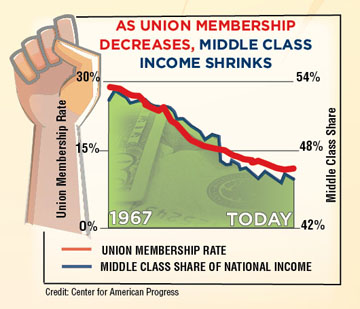 Middle class income has always, historically, been in direct proportion to union density. In a popular piece he wrote for Labor Notes, titled “Viewpoint: A Smart Strategy to Defeat ‘Right-to-Work,” Rand Wilson nails one of the biggest challenges facing the labor movement today:
Middle class income has always, historically, been in direct proportion to union density. In a popular piece he wrote for Labor Notes, titled “Viewpoint: A Smart Strategy to Defeat ‘Right-to-Work,” Rand Wilson nails one of the biggest challenges facing the labor movement today:
“Supporters of right-to-work cynically play on the resentment many workers feel about their declining standard of living. Absent a union contract, the vast majority have few, if any ways, to address it. To most, organizing looks impossible, and politics looks broken. Workers’ understandable frustration is fertile ground for the far right, which promises to improve the business climate and create more jobs by stripping union members of their power.”
What are the best ways we can build union power in the face of these enormous challenges? Our 2017 Emerging Leaders Conference on Oct. 13-14 hopes to address just this question.
With grief and enormous compassion, Wilson’s observation makes me think of my parents. Both grew up in the working-class Irish Catholic neighborhoods of Baltimore. Both were raised in poor, single-parent households. They married young. They obtained a decent standard of living through hard work, my mom’s union job, and white privilege, not necessarily in that order. For decades, my mom has worked a union job as a school bus attendant for special-needs children. She doesn’t make a lot of money, but her union job affords my parents wonderful benefits that support both of them to this day. Like most workers, they’ve experienced a decline in their standard of living, which has caused them pain and confusion.
I’ve watched right-wing leaders and ideologues manipulate their pain and confusion into vile forms of fear, bigotry, hatred, prejudice, and anger. The story of my parents serves as only a microscopic glimpse into the successful workings of right-wing populism, which is in direct competition with the labor movement for the hearts and minds of many working people.
In exchange for tiny crumbs of “better treatment” and the ability to be complicit in the oppression of people of color and immigrants, my parents support leaders who and policies that jeopardize Medicare, Social Security, their retirement — and several other economic and social benefits won by our sisters, brothers, and siblings in the labor movement over the past century. These very same working family protections are the only thing standing between my parents and poverty. No worker anywhere benefits from these tremendous losses.
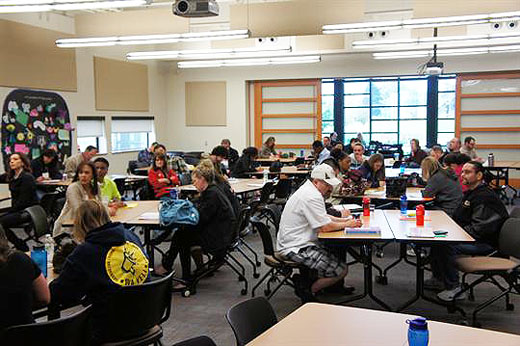 This year’s Emerging Leaders Conference, co-sponsored by the Washington State Labor Education and Research Center (WA LERC) and the Washington Young Emerging Labor Leaders (WA YELL), examines the tools we have at our disposal — and the tools we should be crafting — to win the battle against RTW and the war against working people. How do we win in the face of the ceaseless and creative divide and conquer strategies and tactics of our opponents?
This year’s Emerging Leaders Conference, co-sponsored by the Washington State Labor Education and Research Center (WA LERC) and the Washington Young Emerging Labor Leaders (WA YELL), examines the tools we have at our disposal — and the tools we should be crafting — to win the battle against RTW and the war against working people. How do we win in the face of the ceaseless and creative divide and conquer strategies and tactics of our opponents?
This year’s conference theme is Social Justice Unionism in the Face of RTW. The conference will be held at the Georgetown Campus of South Seattle College, the evening of Friday, Oct. 13, and all day Saturday, Oct. 14. For more precise information about times and the agenda, as well as a link to registration, visit the WA LERC website. General conference registration can be found here. The registration fee is $95 and is all-inclusive: meals and snacks are covered. The conference is geared toward members of any age who are just on the verge of stepping into deeper leadership roles in their unions.
The conference begins on Friday evening with a panel on the meaning of social justice unionism and on what we can do as we face RTW head-on in the public sector.
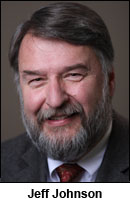 On Saturday morning, the conference reconvenes with our keynote panel event, “The Role of Racial Justice in the Labor Movement.” Moderated by Jeff Johnson, President of the Washington State Labor Council, AFL-CIO, this panel builds on the tremendous leadership the WSLC demonstrates nationally to highlight the central role of racial justice in our labor movement, particularly in an era of right-wing populism and the alt-right movement.
On Saturday morning, the conference reconvenes with our keynote panel event, “The Role of Racial Justice in the Labor Movement.” Moderated by Jeff Johnson, President of the Washington State Labor Council, AFL-CIO, this panel builds on the tremendous leadership the WSLC demonstrates nationally to highlight the central role of racial justice in our labor movement, particularly in an era of right-wing populism and the alt-right movement.
Panelists will include Bill Fletcher, an internationally renowned labor and civil rights activist; Jane Hopkins, Executive Vice President, SEIU 1199NW; Ligaya Domingo, Education Director, SEIU 1199NW; Kent Wong, Director of the UCLA Labor Center and Vice President of the California Federation of Teachers; and Jessie Hagopian, nationally renowned education activist and galvanizing unionist. To culminate this event, we will honor this year’s recipient of the Sarah Laslett Emerging Leaders Award.
This keynote panel event is from 9 to 11 a.m. on Saturday, Oct. 14 and is open to the public. Refreshments will be served. RSVP is required. Everyone is welcome.
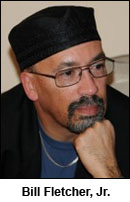 Bill Fletcher will teach a workshop on how we can respond constructively to right-wing populism. Sarah Laslett, who was the previous director of the WA LERC and now serves as faculty at the Oregon LERC, will teach a workshop on winning issues campaigns in the workplace. We will also have workshops on storytelling as an internal and external organizing tool, facilitated by Dante Garcia, Owner & Strategist for the Digital Manatee Creative Cooperative; member-to-member internal organizing, facilitated by IBEW 77; demonstrating our value as unions in a RTW world, facilitated by PTE 17; and organizing in an open shop, facilitated by SEIU 925.
Bill Fletcher will teach a workshop on how we can respond constructively to right-wing populism. Sarah Laslett, who was the previous director of the WA LERC and now serves as faculty at the Oregon LERC, will teach a workshop on winning issues campaigns in the workplace. We will also have workshops on storytelling as an internal and external organizing tool, facilitated by Dante Garcia, Owner & Strategist for the Digital Manatee Creative Cooperative; member-to-member internal organizing, facilitated by IBEW 77; demonstrating our value as unions in a RTW world, facilitated by PTE 17; and organizing in an open shop, facilitated by SEIU 925.
A primary objective of the WA LERC is to develop educational opportunities that build the labor movement. By necessity, this type of education moves union members beyond the agenda of their individual union and asks them to think critically and collectively — in solidarity with their sisters, brothers, and siblings — about some of the biggest issues facing the labor movement.
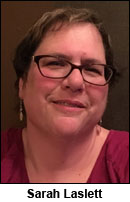 The Emerging Leaders Conference is a primary venue in which this type of labor education occurs. The conference originated from the visionary work of Sarah Laslett, previous Director of WA LERC, and Cheryl Coney, a previous Labor Educator with WA LERC, in an effort to help prepare the next generation of labor leaders in Washington state to take the helm. Previous participants are now leaders in their Central Labor Councils; presidents, political directors, and rank-and-file leaders of their unions; and in high-level local government and union staff positions.
The Emerging Leaders Conference is a primary venue in which this type of labor education occurs. The conference originated from the visionary work of Sarah Laslett, previous Director of WA LERC, and Cheryl Coney, a previous Labor Educator with WA LERC, in an effort to help prepare the next generation of labor leaders in Washington state to take the helm. Previous participants are now leaders in their Central Labor Councils; presidents, political directors, and rank-and-file leaders of their unions; and in high-level local government and union staff positions.
Our opponents have long understood the power of education to build a movement, and succeeded they have. One-on-one internal organizing conversations are a powerful tactic, but these conversations will not be enough to undo decades of neoconservative inculcation through which many of our members are wading.
Our 2017 Emerging Leaders Conference is our small attempt to approach our current challenges strategically and offensively and to inculcate differently — to facilitate a rare multi-union education setting in which sisters, brothers, and siblings across industries and sectors share knowledge, stories, and experience on the shop floor, realizing solidarity and building lasting community and relationships in the process. This is what strategic movement-building is all about. Please join us and help us realize this vision.
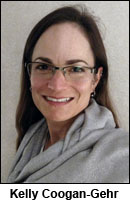 Kelly Coogan-Gehr is the Executive Director of the Washington State Labor Education and Research Center at South Seattle College.
Kelly Coogan-Gehr is the Executive Director of the Washington State Labor Education and Research Center at South Seattle College.





